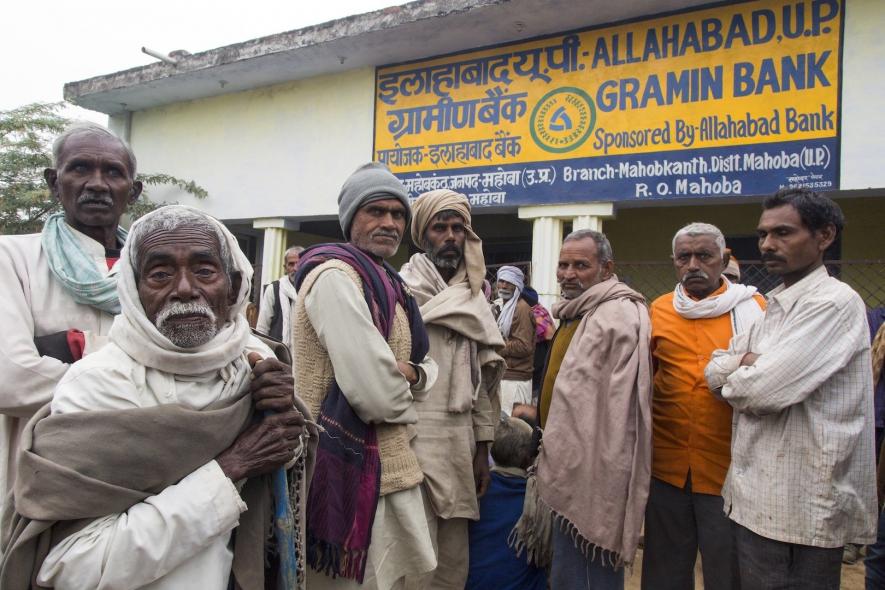Farmers Still not Recovered from Note-Ban Destruction

Image Courtesy: The Wire
A year since demonetisation, farmers are still recovering from the after-effects in states as far apart as Punjab and Kerala.
There is an ongoing agrarian crisis in India, with the past few months seeing farmers’ movements getting intensified in most parts of the country, especially in the BJP-ruled states, such as Madhya Pradesh, Maharashtra and Rajasthan.
The sudden November 8 announcement last year by Prime Minister Narendra Modi – banning all Rs 500 and Rs 1,000 currency notes in the country – exacerbated the agrarian distress for debt-ridden farmers across the country.
In Punjab and neighbouring Haryana, paddy procurement season was at its peak and payments of over Rs 20,000 crore were yet to be made to the farming community when the note ban was announced, reports IANS.
The withdrawal of the old currency notes and non-availability of the new ones led to stoppage of operations of cooperative banks and long queues outside bank branches in rural areas, virtually destroying the farming economy in the country, with high agricultural output states like Punjab and Haryana feeling the effect especially.
“The Arhtiyas (commission agents) took full advantage of the situation. Most farmers were already reeling under debt and money was not available to pay them back. The payments for procured paddy were delayed and the situation took a turn for the worst,” Baljit Singh, a farmer from Mahilpur in Hoshiarpur district, Punjab, told IANS.
“It seems the Modi government had no idea of the toll it would take on the poor, debt-ridden farmers in agrarian states like ours. The move was most ill-timed pushing many farmers further into debt. It was economic anarchy,” he said.
Farmer Randeep Singh of Sangrur district in Punjab told the news agency, “For several weeks, farmers had to suffer, as they could not buy seeds and fertilisers for the next crop on time after the paddy harvest. The government and its agencies did little to help us.”
The horticulture sector in Punjab suffered enormous losses because perishable fruits and vegetables with low shelf life were stuck with growers. They couldn’t even transport it to markets. And traders were offering half or one third prices to those who managed to get their produce to the mandi.
“The agrarian economy is still reeling under the after-effects of the demonetisation and its cascading effect. The horticulture sector was the worst hit as the citrus fruits like Kinnow were already in the markets and orders were cancelled overnight,” Amarjit Singh, a horticulturist from the Abohar-Fazilka belt of southwest Punjab, told IANS.
The news agency gives the example of Adiraj, a youngster who had picked up orders for the supply of tangerines grown in his family orchard, but suddenly found buyers cancelling orders.
“Fruits and vegetables have a restricted shelf life of 3-7 days,” horticulturist Kulwant Singh told IANS. “These have to be sold and consumed. As orders were cancelled or payments were stuck, growers suffered. The horticulture sector has still not recovered.”
Punjab, which contributes nearly 50% of the foodgrains to the central kitty, is among the states that have witnessed suicides by farmers unable to repay debt.
“Look at the spate of suicides in Punjab, especially by young farmers who are under debt. Some of them have outstanding loans of less than Rs 5 lakh but are unable to pay these back and are committing suicide. The central and state governments are only doing lip service and no one is really bothered,” the IANS quotes farmer leader Rajwant Singh as saying.
In Kerala, the agriculture sector has suffered the worst impact of the note ban in the state. Rubber plantations have been particularly affected, with the small rubber farmers bearing the brunt.
Thomas Mathew, a small rubber farmer in Kottayam, told the IANS, “We continue to be affected by demonetisation. It came when rubber prices were already low. It was a cruel jolt as rubber dealers had no money to pay us and this went on for long. For those who had no other source of income, it was a nightmare.”
Similarly, those engaged in cultivation of cash crops like banana and arecanut continued to face the nightmare. In banana cultivation, November and December are generally the months when fresh plants are sown. But with hardly any cash to pay for the plants, many had to forego the season’s cultivation, reports the news agency.
Daily wage earners were the worst hit because they were deprived of the earnings for several weeks. Many had to borrow in order to just survive.
“We survive by working in small homesteads and with no cash available, people used to avoid calling us to do the daily labour. This went on for several months and that hit us very badly. We wish to know who benefited through this foolish exercise,” Sasidharan, a daily labourer, told IANS.
Get the latest reports & analysis with people's perspective on Protests, movements & deep analytical videos, discussions of the current affairs in your Telegram app. Subscribe to NewsClick's Telegram channel & get Real-Time updates on stories, as they get published on our website.
























